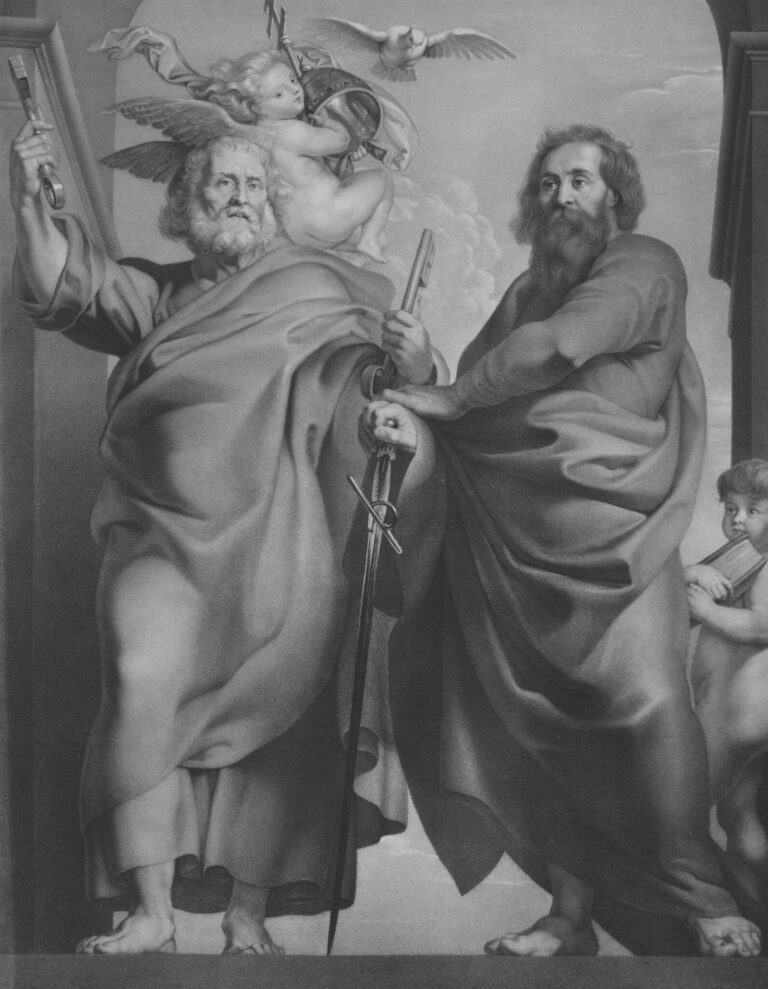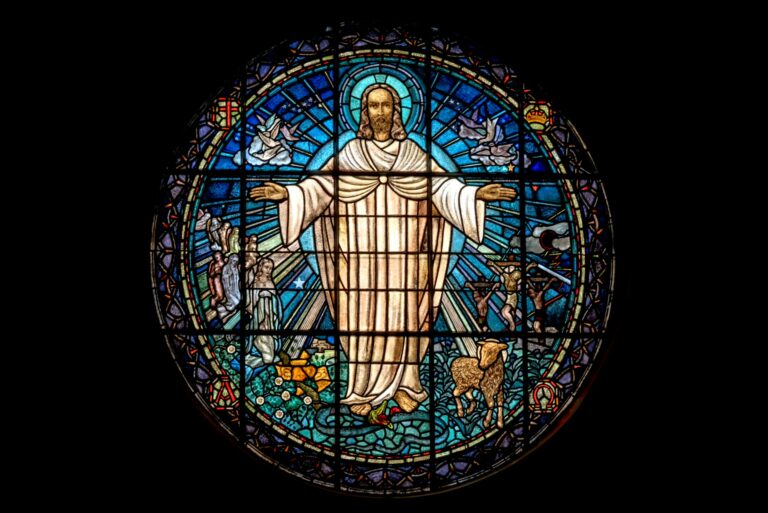The history of Christianity is a rich tapestry woven through various eras, each marked by significant events, challenges, and developments that have shaped our faith. As we journey through these eras, we see God’s hand guiding His church, preserving the truth of the Gospel, and expanding His kingdom. From the time of Christ to the present day, the timeline of Christianity reveals a story of endurance, transformation, and hope.
Read Our Related Article: History Of The Christian Faith
The Apostolic Era (AD 30–100)
The Apostolic Era marks the beginning of Christianity, starting with the ministry of Jesus and extending through the lives of His apostles. The cornerstone of this era is the life, death, and resurrection of Jesus Christ, as recorded in the Gospels. Matthew 28:19-20 records Jesus’ Great Commission to His disciples: “Go ye therefore, and teach all nations, baptizing them in the name of the Father, and of the Son, and of the Holy Ghost: Teaching them to observe all things whatsoever I have commanded you.” This command set the stage for the spread of Christianity.
After Jesus’ ascension, the apostles, filled with the Holy Spirit at Pentecost, began to preach the Gospel boldly. The book of Acts details the rapid growth of the early church, despite persecution. Acts 2:41 tells us, “Then they that gladly received his word were baptized: and the same day there were added unto them about three thousand souls.” The church grew, first in Jerusalem and then throughout the Roman Empire, as the apostles spread the message of salvation.
During this period, the New Testament scriptures were written, capturing the teachings of Jesus and the apostles. These writings became the foundation of Christian doctrine and practice, guiding the early believers in their faith.
The Patristic Era (AD 100–500)
The Patristic Era, also known as the era of the Church Fathers, followed the apostolic period. This era was marked by the defense of the faith against heresies and the establishment of core Christian doctrines. Jude 1:3 exhorts us to “earnestly contend for the faith which was once delivered unto the saints.” The early church fathers took this charge seriously, engaging in theological debates to preserve the truth of the Gospel.
During this time, key doctrines such as the Trinity and the nature of Christ were defined. The Council of Nicaea in AD 325 was a significant event in this era, addressing the Arian controversy, which questioned the divinity of Christ. The Nicene Creed, formulated at this council, affirmed the co-equal and co-eternal nature of the Father, Son, and Holy Spirit. John 1:1 became a crucial text in these debates: “In the beginning was the Word, and the Word was with God, and the Word was God.”
The Patristic Era also saw the spread of monasticism, which played a vital role in the preservation of Christian texts and the spread of the faith. Monks like Anthony the Great and Benedict of Nursia established monastic communities that became centers of learning and spiritual discipline.
The Medieval Era (AD 500–1500)
The Medieval Era, often referred to as the Middle Ages, was a time of both growth and challenge for Christianity. The fall of the Roman Empire led to the rise of the Roman Catholic Church as a dominant spiritual and political force in Europe. The church became the primary institution for preserving and transmitting knowledge during this period.
However, the Medieval Era was also a time of spiritual darkness for many. The rise of feudalism and the intertwining of church and state led to corruption within the church. The selling of indulgences and other practices that deviated from biblical teaching became widespread. Despite these challenges, God preserved a remnant of faithful believers who sought to keep the truth of the Gospel alive.
One of the most significant events of this era was the Great Schism of 1054, which split Christianity into the Roman Catholic Church in the West and the Eastern Orthodox Church in the East. This division was rooted in theological and political differences, including disagreements over the authority of the Pope and the wording of the Nicene Creed. Ephesians 4:3 urges us to “endeavor to keep the unity of the Spirit in the bond of peace,” yet this period was marked by division rather than unity.
The Crusades, which began in the late 11th century, were another defining feature of the Medieval Era. These military campaigns, sanctioned by the church, aimed to reclaim the Holy Land from Muslim control. While intended to protect Christian pilgrims and holy sites, the Crusades often led to more problems than solutions, leaving a complex legacy for the church.
Amid these challenges, the Medieval Era also witnessed the rise of great theologians such as Augustine of Hippo and Thomas Aquinas, whose writings continue to influence Christian thought today. Proverbs 2:6 reminds us, “For the Lord giveth wisdom: out of his mouth cometh knowledge and understanding.” These theologians sought to apply biblical wisdom to the issues of their time, contributing to the church’s doctrinal development.
The Reformation Era (AD 1500–1700)
The Reformation Era was a period of significant upheaval and renewal in the church. Sparked by Martin Luther’s Ninety-Five Theses in 1517, the Reformation challenged the practices and doctrines of the Roman Catholic Church, calling for a return to the authority of Scripture. 2 Timothy 3:16 became a foundational verse for the reformers: “All scripture is given by inspiration of God, and is profitable for doctrine, for reproof, for correction, for instruction in righteousness.”
The Reformation led to the formation of Protestant denominations, including Lutheranism, Calvinism, and Anglicanism. These movements emphasized salvation by faith alone, the priesthood of all believers, and the importance of reading and interpreting the Bible for oneself. Ephesians 2:8-9 was often cited to support the doctrine of justification by faith: “For by grace are ye saved through faith; and that not of yourselves: it is the gift of God: Not of works, lest any man should boast.”
The Reformation also had a profound impact on society, leading to increased literacy as people sought to read the Bible in their own languages. The invention of the printing press played a crucial role in this, allowing for the widespread distribution of the Bible and Reformation writings. This era saw the translation of the Bible into vernacular languages, making God’s Word accessible to ordinary people. Psalm 119:105 captures the essence of this movement: “Thy word is a lamp unto my feet, and a light unto my path.”
However, the Reformation was not without its conflicts. Religious wars and persecution followed, as different Christian groups sought to assert their beliefs. Despite these challenges, the Reformation laid the groundwork for the modern Christian church, emphasizing the centrality of Scripture and the importance of personal faith.
The Modern Era (AD 1700–Present)
The Modern Era has been marked by the continued spread of Christianity around the world. The Great Awakenings of the 18th and 19th centuries were periods of religious revival that swept through Europe and America, leading to the growth of evangelicalism and the rise of missionary movements. Matthew 28:19 continued to inspire believers to take the Gospel to the ends of the earth: “Go ye therefore, and teach all nations.”
Missionaries like William Carey, often called the “father of modern missions,” and Hudson Taylor, who founded the China Inland Mission, were instrumental in spreading Christianity to Asia, Africa, and beyond. Their work was rooted in the conviction that every person needed to hear the Gospel and have the opportunity to respond to Christ. Romans 10:14-15 captures the heart of their mission: “How then shall they call on him in whom they have not believed? And how shall they believe in him of whom they have not heard? And how shall they hear without a preacher? And how shall they preach, except they be sent?”
The Modern Era has also seen the rise of Pentecostalism and the Charismatic movement, emphasizing the work of the Holy Spirit and the practice of spiritual gifts. These movements have brought a renewed focus on the power of God to transform lives and the importance of experiential faith. Acts 2:17 is often cited in this context: “And it shall come to pass in the last days, saith God, I will pour out of my Spirit upon all flesh.”
In the 20th century, the church faced new challenges, including the rise of secularism, the spread of liberal theology, and increasing persecution in many parts of the world. Yet, despite these obstacles, the church has continued to grow, particularly in the Global South, where Christianity is flourishing. Matthew 16:18 reassures us of Christ’s promise: “And I say also unto thee, That thou art Peter, and upon this rock I will build my church; and the gates of hell shall not prevail against it.”
The Modern Era has also been a time of ecumenical efforts, as Christians from different traditions seek to work together for the sake of the Gospel. The World Council of Churches, founded in 1948, is one example of this, bringing together churches from around the world in a spirit of cooperation and unity. John 17:21 captures the prayer of Jesus for His followers: “That they all may be one; as thou, Father, art in me, and I in thee, that they also may be one in us: that the world may believe that thou hast sent me.”
As we reflect on the eras of Christianity, we see a pattern of growth, challenge, and renewal. Each era has brought its own unique contributions to the development of our faith, and through it all, God has remained faithful. Hebrews 13:8 reminds us, “Jesus Christ the same yesterday, and today, and forever.” Our journey through history is not just about looking back but also about moving forward, grounded in the truth of the Gospel and the hope of Christ’s return.
Today, we continue to live out our faith in a rapidly changing world. The challenges we face are different from those of previous eras, yet the call remains the same. We are called to be faithful witnesses of Christ, to stand firm in the truth of Scripture, and to share the hope of the Gospel with a world in need. 2 Timothy 4:2 encourages us, “Preach the word; be instant in season, out of season; reprove, rebuke, exhort with all longsuffering and doctrine.”
The timeline of Christianity is a testament to God’s enduring faithfulness. From the Apostolic Era to the present day, He has been at work, building His church and advancing His kingdom. As we look to the future, we do so with confidence, knowing that the same God who has guided His people through the centuries will continue to lead us. Philippians 1:6 assures us, “Being confident of this very thing, that he which hath begun a good work in you will perform it until the day of Jesus Christ.”
Our place in this timeline is significant. We are part of a larger story, a story that began with the creation of the world and will culminate in the return of Christ. As we navigate the challenges and opportunities of our time, let us remember that we are not alone. We are surrounded by a great cloud of witnesses, those who have gone before us, and we are upheld by the One who is the author and finisher of our faith (Hebrews 12:1-2).
The eras of Christianity remind us that our faith is rooted in history, yet it is alive and active today. We are called to carry the torch of faith forward, to be faithful in our generation, and to leave a legacy for those who will come after us. Psalm 145:4 captures this beautifully: “One generation shall praise thy works to another, and shall declare thy mighty acts.” This is our calling, and this is our joy.






